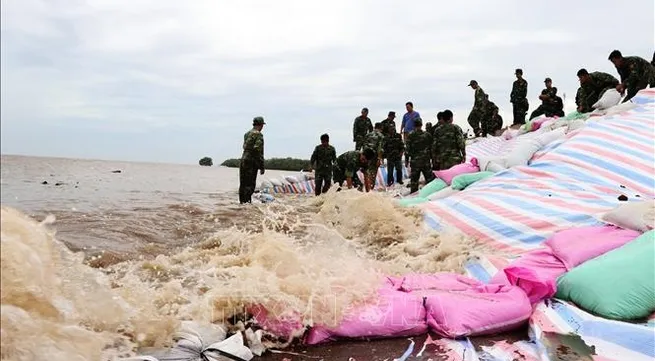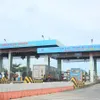Focus on natural calamity control


|
| Soldiers take part in dyke reinforcement in the Cửu Long Delta province of Tiền Giang. – VNA/VNS |
HÀ NỘI — Projects to prepare for natural disasters and respond to climate change will be further enhanced this year, according to instructions from the National Committee for Natural Calamity Prevention.
The General Department of Natural Calamity Prevention has been asked to speed up the progress of construction and implementation of strategies and projects such as the national disaster prevention plan; the overall scheme to prevent river and coastal erosion around the country and the Mekong Delta region; the overall project of natural disaster prevention and control in the northern mountainous, central and Tây Nguyên (Central Highlands) regions; a project of residential relocation for disaster-hit areas, and the project to build the National Disaster Prevention and Control Centre.
Minister of Agriculture and Rural Development Nguyễn Xuân Cường, who is the head of the National Committee on Natural Calamity Prevention, has asked the general department to improve the capacity to cope with natural disasters, with a focus on examining and evaluating the current conditions of dyke systems before the rainy and flood season as well as setting up response plans and boosting work of dyke maintenance.
Inspection and handling of violations to legal regulations on dyke protection and sand and gravel exploitation must be further accelerated this year to ensure safety.
The general department needs to closely monitor the operation of reservoirs on 11 river basins across the country, especially the Hồng (Red) and Thái Bình rivers, so as to ensure safety for downstream areas, according to Cường.
It is necessary to build up support tools and databases for operation such as storm and tropical low pressure maps; electronic databases on disaster prevention along river areas; and real-time calculation of flood and sea level rises.
Round-the-clock weather and natural calamity monitoring must be performed to provide immediate response measures if incidents occur.
In terms of the application of science and technology and international co-operation, Cường instructed the general department to set up a comprehensive database of natural disaster prevention to share with relevant agencies and the community, and to carry out online monitoring of key projects and critical locations and vulnerable areas via cameras and remote sensing equipment.
The general department should promote the application of science and technology in the construction of natural disaster prevention and control projects such as landslide prevention, dyke reinforcement, and flash flood prevention, and pilot installation of automatic warning systems for flash floods and landslides in some mountainous provinces.
International co-operation in natural disaster prevention and fund mobilisation from domestic and foreign sources for emergency response and disaster prevention needed enhancing, the minister said.
According to him, improvement of community awareness on natural calamity preparedness and community-based risk management is an important task.
It is necessary to set up a communication strategy for this year including providing materials that are attractive and easy to understand for people, especially those from ethnic minority groups and those in remote areas.
Last year, natural calamities occurred across the country with 13 storms and 14 severe flash floods and landslides, reported online newspaper baotintuc.vn.
The natural disasters cost up to VNĐ20 trillion (US$862 million) and caused 218 deaths.
In 2018, the general department compiled some laws and legal documents relating to dyke protection and natural disaster prevention.
As per the general department’s suggestion, the Government provided VNĐ1.5 trillion ($64.7 million) to the programme of sustainable development for the Cửu Long (Mekong) Delta Region with climate change adaptation.
The general department also proposed an investment of US$36 million funded by the World Bank and Asian Development Bank to carry out two projects of river and coastal erosion prevention, and drawing out maps of river and coastal erosion in Cửu Long Delta region.
The general department also submitted a draft of the national strategy for natural disaster prevention by 2030; a master plan of emergency evacuation, and flash flood and landslide prevention; a master plan on natural disaster prevention in the northern mountainous, the central and Central Highlands regions; a project on improving national capacity for natural disaster prevention; and adjustment for the project on community awareness raising and community-based disaster risk management. – Khanh
Tags:





